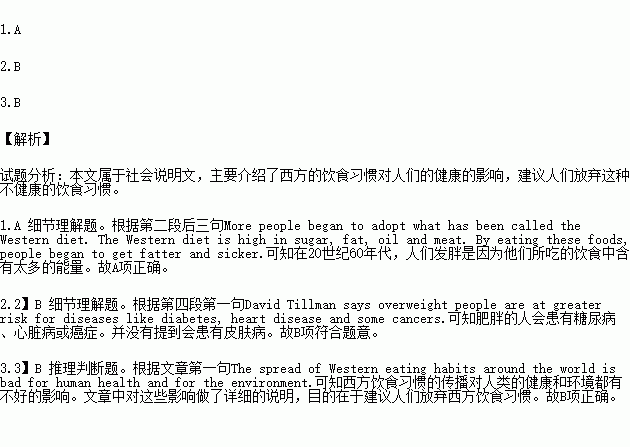题目内容
The spread of Western eating habits around the world is bad for human health and for the environment. Those findings come from a new report in the journal Nature.
David Tilman is a professor at the University of Minnesota. In the study, he examined information from 100 nations to show what people ate and how diet affected health. Mr. Tilman noted a movement beginning in the 1960s. He found that as nations industrialized(工业化), population increased and earnings rose. More people began to adopt what has been called the Western diet. The Western diet is high in sugar, fat, oil and meat. By eating these foods, people began to get fatter and sicker.
“The food, let us say, in the 15 richest nations of the world, right now contains about 400 or 500 extra calories(热量) a day that are eaten beyond what people need, and that leads people to gain weight.”
David Tillman says overweight people are at greater risk for diseases like diabetes, heart disease and some cancers. Diabetes is shooting to very high rates in the United States and across Europe. Heart disease is a major cause of death in the Western nations. Unfortunately when people become industrialized, if they adopt this Western diet, they are going to have these same health problems.
A diet bad for human beings, it seems, is also bad for the environment. As the world’s population grows, experts say more forests and areas will become farmland for crops or grasslands for raising cattle. These areas will be needed to meet the increasing demand for food.
Mr. Tilman calls the link between diet, the environment and human health, “a dilemma”, a situation where it is very difficult to decide what to do. He says one possible solution is leaving the Western diet behind.
1.Why did people get fatter in the 1960s?
A. They ate foods high in calories.
B. They adopted a western lifestyle.
C. They set aside little time for exercise.
D. They had a better life and became lazier.
2.According to the text, overweight people may suffer the following diseases EXCEPT_______.
A. diabetes B. skin disease
C. cancers D. heart disease
3.What is the purpose of the author in writing this passage?
A. To tell people effective ways to keep healthy.
B. To call on people to give up the Western diet.
C. To show the problems industrialized nations are facing.
D. To draw people’s attention to environmental protection.



